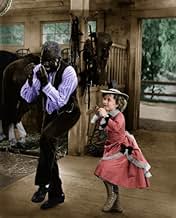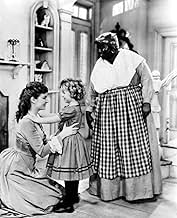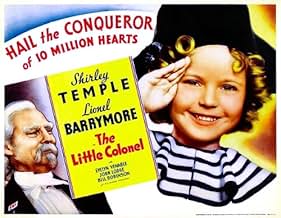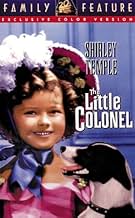In the post-Civil war south, a darling little girl attempts to restore the peace between her parents and her plantation owner grandfather.In the post-Civil war south, a darling little girl attempts to restore the peace between her parents and her plantation owner grandfather.In the post-Civil war south, a darling little girl attempts to restore the peace between her parents and her plantation owner grandfather.
- Awards
- 2 wins & 1 nomination total
Stephen Chase
- Hull
- (as Alden Chase)
C.E. Anderson
- Overseer
- (uncredited)
Martin Faust
- Frontiersman
- (uncredited)
Rolland Hamblen
- Trooper Doing Egg Trick
- (uncredited)
Frank Hammond
- Carriage Driver
- (uncredited)
Featured reviews
A little girl tries to mend the relationship between her mother and grandfather.
The Little Colonel is Shirley Temple at her best. She does a wonderful tap routine with Bill Robinson. Lionel Barrymore is good as the curmudgeonly grandfather, and Hattie McDaniel gives a wonderful supporting performance.
Recmomended. First time viewing. 3.5/5
The Little Colonel is Shirley Temple at her best. She does a wonderful tap routine with Bill Robinson. Lionel Barrymore is good as the curmudgeonly grandfather, and Hattie McDaniel gives a wonderful supporting performance.
Recmomended. First time viewing. 3.5/5
The opening scene of "The Little Colonel" is set somewhere in the Deep South in the 1870s. The Civil War had been over for years, but plantation owner, Colonel Lloyd, still carried a hatred for the Yankees. When his daughter, Elizabeth, plans to marry a man from the North, Jack Sherman, Lloyd disowns her. Segue to six years later, at an Army cavalry post somewhere in the Northwest, and a special formation has been called by Colonel Gray for the commissioning of a new officer. Six-year-old Lloyd Sherman is commissioned a colonel in the U. S. Army. She is the daughter of Jack and Elizabeth Sherman, and has endeared herself to the whole post.
So sets the stage for this movie that stars six-year-old Shirley Temple as Lloyd Sherman - that is, Colonel Lloyd Sherman. Lionel Barrymore plays her grandfather, Col. Lloyd, Evelyn Venable plays Elizabeth and John Lodge plays Jack Sherman. But the best of the supporting cast in this film - after Barrymore, are the black servants who have stayed on the Lloyd's plantation after the Civil War abolished slavery. Bill Robinson plays the colonel's butler, Walker, and Hattie McDaniel plays the cook, Mom Beck. They share of the singing and dancing with young Shirley that add the musical aspects to the comedy drama and family film.
Robinson's staircase dance routine is memorable, and one has to note that he was "no spring chicken" when this movie was made. Robinson was the same age as Barrymore, 57, with both actors having been borne in 1878. Barrymore had to don the white hair and beard to look older, and Robinson may have had some sprinkling of powder for the light touch of white in his hair. Robinson went by the nickname, Bojangles, and was one of the best tap dancers in the world. He started young and performed in vaudeville, on stage and in the movies. And, Hattie McDaniel would become the first African-American to win an Academy Award, in 1940. She won the best supporting actress for her role as Mammy, in the great 1939 production of "Gone With the Wind."
The plot for this film is a good story in which the young Colonel Lloyd Sherman resolves all the problems and disagreements and it ends happily for everyone - well, except for a couple of bad guys who, we assume get what's coming to 'em.
I enjoyed watching this film again - these many, many years after seeing it on late night TV in the 1950s-60s. And, this time in color. Here are a couple of favorite lines from the film.
Dr. Scott, "Marriage is a wonderful institution." Colonel Lloyd, "Yes, us, no family should be without it."
May Lily, "You can't be no colonel." Lloyd Sherman, "Why not?" May Lily, "Because you ain't got no whiskers." Lloyd Sherman, "I don't need to have whiskers. I've got a temper. That's all you need to be a colonel."
So sets the stage for this movie that stars six-year-old Shirley Temple as Lloyd Sherman - that is, Colonel Lloyd Sherman. Lionel Barrymore plays her grandfather, Col. Lloyd, Evelyn Venable plays Elizabeth and John Lodge plays Jack Sherman. But the best of the supporting cast in this film - after Barrymore, are the black servants who have stayed on the Lloyd's plantation after the Civil War abolished slavery. Bill Robinson plays the colonel's butler, Walker, and Hattie McDaniel plays the cook, Mom Beck. They share of the singing and dancing with young Shirley that add the musical aspects to the comedy drama and family film.
Robinson's staircase dance routine is memorable, and one has to note that he was "no spring chicken" when this movie was made. Robinson was the same age as Barrymore, 57, with both actors having been borne in 1878. Barrymore had to don the white hair and beard to look older, and Robinson may have had some sprinkling of powder for the light touch of white in his hair. Robinson went by the nickname, Bojangles, and was one of the best tap dancers in the world. He started young and performed in vaudeville, on stage and in the movies. And, Hattie McDaniel would become the first African-American to win an Academy Award, in 1940. She won the best supporting actress for her role as Mammy, in the great 1939 production of "Gone With the Wind."
The plot for this film is a good story in which the young Colonel Lloyd Sherman resolves all the problems and disagreements and it ends happily for everyone - well, except for a couple of bad guys who, we assume get what's coming to 'em.
I enjoyed watching this film again - these many, many years after seeing it on late night TV in the 1950s-60s. And, this time in color. Here are a couple of favorite lines from the film.
Dr. Scott, "Marriage is a wonderful institution." Colonel Lloyd, "Yes, us, no family should be without it."
May Lily, "You can't be no colonel." Lloyd Sherman, "Why not?" May Lily, "Because you ain't got no whiskers." Lloyd Sherman, "I don't need to have whiskers. I've got a temper. That's all you need to be a colonel."
Having earned her nickname due to her stubborn temper, THE LITTLE COLONEL courageously tries to reunite her splintered family.
Shirley Temple smiles, pouts, tosses her curly locks and completely runs away with the movie. One of her early family classics, this is an excellent showcase for her tremendous charm & abundant talents. As box-office queen, the mighty moppet would dominate Hollywood during the second half of the 1930's. Never was a despot so welcomed or a tyrant so loved.
As one of the industry's finest character actors, crusty Lionel Barrymore gives the little lady a run for her money. Always entertaining, he knows when to purr or when to roar to maximum effect, even if he doesn't quite eclipse Little Miss Personality.
Hattie McDaniel adds her own unique gifts to the role of Shirley's faithful servant, never allowing her dignity to be demeaned. As always, she is a joy. The legendary Bill Robinson is also on hand, mostly, one suspects, so as to partner Shirley in a couple of dances and they are wonderful, especially in Robinson's signature Staircase Dance. They are perfectly matched - one ramrod straight & ebony, the other tiny & blonde - and their minutes together on the screen is the stuff of which movie magic is made.
Evelyn Venable & John Lodge, as Shirley's parents (it's rare for her to have both all the way through a film) do nicely with the romantic angle, but it's kept to a minimum, as is usual in a Temple film, where the spotlight is kept firmly focused on her. Sidney Blackmer appears as a smooth swindler who makes the serious mistake of angering THE LITTLE COLONEL.
Although the film is given good production values by 20th Century Fox, it is the interaction between little Shirley and the other performers which far and away is the most important aspect of the picture.
It should be noted that there are elements of racism in the story line, a not uncommon occurrence in Hollywood films of the 1930's.
The final scene segues into early Technicolor - a pleasant way to end the story.
Shirley Temple smiles, pouts, tosses her curly locks and completely runs away with the movie. One of her early family classics, this is an excellent showcase for her tremendous charm & abundant talents. As box-office queen, the mighty moppet would dominate Hollywood during the second half of the 1930's. Never was a despot so welcomed or a tyrant so loved.
As one of the industry's finest character actors, crusty Lionel Barrymore gives the little lady a run for her money. Always entertaining, he knows when to purr or when to roar to maximum effect, even if he doesn't quite eclipse Little Miss Personality.
Hattie McDaniel adds her own unique gifts to the role of Shirley's faithful servant, never allowing her dignity to be demeaned. As always, she is a joy. The legendary Bill Robinson is also on hand, mostly, one suspects, so as to partner Shirley in a couple of dances and they are wonderful, especially in Robinson's signature Staircase Dance. They are perfectly matched - one ramrod straight & ebony, the other tiny & blonde - and their minutes together on the screen is the stuff of which movie magic is made.
Evelyn Venable & John Lodge, as Shirley's parents (it's rare for her to have both all the way through a film) do nicely with the romantic angle, but it's kept to a minimum, as is usual in a Temple film, where the spotlight is kept firmly focused on her. Sidney Blackmer appears as a smooth swindler who makes the serious mistake of angering THE LITTLE COLONEL.
Although the film is given good production values by 20th Century Fox, it is the interaction between little Shirley and the other performers which far and away is the most important aspect of the picture.
It should be noted that there are elements of racism in the story line, a not uncommon occurrence in Hollywood films of the 1930's.
The final scene segues into early Technicolor - a pleasant way to end the story.
THE LITTLE COLONEL (Fox, 1935), directed by David Butler, stars Shirley Temple in one of her more famous movie roles during her early years as a young performer. Aside from her initial teaming with legendary dancer Bill "Bojangles" Robinson (4th billed during opening credits, bottom billed in the closing), with whom she does a memorable "stair" dance, it places her against odds with the crusty Lionel Barrymore, on loan out assignment from MGM, sporting white hair, bushy eyebrows and droopy mustache in the old Southerner/ or Claude Gillingwater Sr. tradition, and what a pair they make.
Based on a story by Annie Fellows Johnston, the plot opens with a prologue set in 1870s Kentucky on a Southern plantation where Colonel Lloyd (Lionel Barrymore) disowns his beloved daughter, Elizabeth (Evelyn Venable) for eloping with a "Yankee", Jack Sherman (John Lodge). During their six years in Philadelphia, Jack and Elizabeth have been blessed with a child, Lloyd (Shirley Temple), whom they witness being commissioned as a "little colonel" by soldiers on a western outpost. With John remaining at the post, Elizabeth returns to Kentucky where she and Lloyd settle in an old cottage left to her by her late mother that happens to be next door to her father. After meeting his granddaughter with an introduction of getting mud thrown on him, he finds her to be just as stubborn and quick tempered as he. In spite of their rugged start and similar personality traits, Grandpa eventually warms up to Lloyd, though his stubbornness keeps him from having anything to do with his daughter, even when learning of swindlers Swazey (Sidney Blackmer) and Hull (Aden Chase) in their home threatening the ailing Jack and Elizabeth to turn over the deed to worthless property they sold him that has been proved valuable.
THE LITTLE COLONEL, a leisurely paced story with familiar theme, relies mostly on the strength of its leading players, Temple and Barrymore. It's also one of the better films in which Temple does not typically play an orphan. Evelyn Venable, whose career failed to take off after a promising start opposite Fredric March in DEATH TAKES A HOLIDAY (Paramount, 1934), provides the opening playing the harp and singing "Love's Young Dream" to her guests. The song is later reprized by Temple serenading to her grandfather as he envisions his daughter at the harp. John Lodge, virtually forgotten but better known for his performance as Count Alexi in THE SCARLET EMPRESS (Paramount, 1934) starring Marlene Dietrich, has little to do until the final half of the story. Hattie McDaniel, four years away her Academy Award winning performance in GONE WITH THE WIND (1939), supports as the Sherman maid, Mom Beck. Dressed in "Aunt Jemima" attire, she shares amusing moments with Colonel Lloyd's butler (Robinson), sharing time together with the "little colonel" at a spiritual gathering witnessing a woman getting dunked in the river where she's having her sins washed away as Negroes sing "The Sun Shines Brighter." Aside from the aforementioned "stair dance," Temple and Robinson do an encore tap dancing to Stephen Foster's "Oh, Susannah" in the stable to harmonica playing by May Lily (Avonne Johnson). Johnson, along with Nyamza Potts as her little brother, Henry Clay, support as Temple's playmates. As in many Temple films, there's a pet dog, this time a pooch named Fritzi. Others in the cast include William Burress (Doctor Scott); Geneva Williams (Maria); and Robert Warwick (Colonel Gray).
Priot to 1985, THE LITTLE COLONEL played frequently on commercial television with the closing segment, filmed in Technicolor, usually absent, with story coming to an abrupt conclusion either after Barrymore's closing line or next scene of McDaniel successfully breaking down the door after being locked in by one of Sherman's "guests." When distributed on video in 1988, the closing Technicolor segment was restored, and shown intact at 82 minutes on cable TV broadcasts on the Disney Channel (early 1990s), American Movie Classics (1996-2001) and finally the Fox Movie Channel. THE LITTLE COLONEL is currently available on DVD in black and white or colorized versions.
The success of THE LITTLE COLONEL brought forth a similar theme and title of THE LITTLEST REBEL (1935), reuniting Temple with Bill Robinson once again, with plot set during the Civll War instead of after-wards. Both classic films with Temple (and Robinson) at the peak of their careers. (***1/2)
Based on a story by Annie Fellows Johnston, the plot opens with a prologue set in 1870s Kentucky on a Southern plantation where Colonel Lloyd (Lionel Barrymore) disowns his beloved daughter, Elizabeth (Evelyn Venable) for eloping with a "Yankee", Jack Sherman (John Lodge). During their six years in Philadelphia, Jack and Elizabeth have been blessed with a child, Lloyd (Shirley Temple), whom they witness being commissioned as a "little colonel" by soldiers on a western outpost. With John remaining at the post, Elizabeth returns to Kentucky where she and Lloyd settle in an old cottage left to her by her late mother that happens to be next door to her father. After meeting his granddaughter with an introduction of getting mud thrown on him, he finds her to be just as stubborn and quick tempered as he. In spite of their rugged start and similar personality traits, Grandpa eventually warms up to Lloyd, though his stubbornness keeps him from having anything to do with his daughter, even when learning of swindlers Swazey (Sidney Blackmer) and Hull (Aden Chase) in their home threatening the ailing Jack and Elizabeth to turn over the deed to worthless property they sold him that has been proved valuable.
THE LITTLE COLONEL, a leisurely paced story with familiar theme, relies mostly on the strength of its leading players, Temple and Barrymore. It's also one of the better films in which Temple does not typically play an orphan. Evelyn Venable, whose career failed to take off after a promising start opposite Fredric March in DEATH TAKES A HOLIDAY (Paramount, 1934), provides the opening playing the harp and singing "Love's Young Dream" to her guests. The song is later reprized by Temple serenading to her grandfather as he envisions his daughter at the harp. John Lodge, virtually forgotten but better known for his performance as Count Alexi in THE SCARLET EMPRESS (Paramount, 1934) starring Marlene Dietrich, has little to do until the final half of the story. Hattie McDaniel, four years away her Academy Award winning performance in GONE WITH THE WIND (1939), supports as the Sherman maid, Mom Beck. Dressed in "Aunt Jemima" attire, she shares amusing moments with Colonel Lloyd's butler (Robinson), sharing time together with the "little colonel" at a spiritual gathering witnessing a woman getting dunked in the river where she's having her sins washed away as Negroes sing "The Sun Shines Brighter." Aside from the aforementioned "stair dance," Temple and Robinson do an encore tap dancing to Stephen Foster's "Oh, Susannah" in the stable to harmonica playing by May Lily (Avonne Johnson). Johnson, along with Nyamza Potts as her little brother, Henry Clay, support as Temple's playmates. As in many Temple films, there's a pet dog, this time a pooch named Fritzi. Others in the cast include William Burress (Doctor Scott); Geneva Williams (Maria); and Robert Warwick (Colonel Gray).
Priot to 1985, THE LITTLE COLONEL played frequently on commercial television with the closing segment, filmed in Technicolor, usually absent, with story coming to an abrupt conclusion either after Barrymore's closing line or next scene of McDaniel successfully breaking down the door after being locked in by one of Sherman's "guests." When distributed on video in 1988, the closing Technicolor segment was restored, and shown intact at 82 minutes on cable TV broadcasts on the Disney Channel (early 1990s), American Movie Classics (1996-2001) and finally the Fox Movie Channel. THE LITTLE COLONEL is currently available on DVD in black and white or colorized versions.
The success of THE LITTLE COLONEL brought forth a similar theme and title of THE LITTLEST REBEL (1935), reuniting Temple with Bill Robinson once again, with plot set during the Civll War instead of after-wards. Both classic films with Temple (and Robinson) at the peak of their careers. (***1/2)
I grew up with Shirley Temple. In 1932 she made 12 movies as an adorable baby doll of four years old. In 1933 she made four films; in 1934 eleven films the best was "Stand Up & Cheer" and "Baby, Take A Bow". In 1935 four films; in 1936 Captain January", in 1937 "Heidi"; in 1938 "Rebecca of Sunnybrook Farm" and "The Little Princess". In 1940 two movies, and in 1941 her first flop. 1944 she made a comeback in "Since You Went Away" and "I'll Be Seeing You". 1947 she made three films including "Bachelor & the Bobby Soxer". 1948 "Fort Apache" when she met her first husband John Agar. In 1949 she made four good films the best of which was "A Kiss for Corliss". Nobody wanted little Shirley to grow up, so I must say my favorite film of hers was "The Little Colonel" in which she sang and danced so well with the famed Bill Robinson. In that film she played against the great Lionel Barrymore.
Did you know
- TriviaShirley Temple memorized every line of dialogue in this movie, and while filming a scene with Lionel Barrymore, the veteran actor forgot a line. When Temple prompted him, Barrymore flew into a such a rage that one crew member took Temple away for fear that Barrymore might harm her. He later apologized to her, and they remained friends for many years.
- GoofsMom Beck telling Lloyd that her mother also had golden curls and pink cheeks as a child when her mother is brunette is not necessarily an error. Many blonde children's hair darkens as they age. Shirley Temple's hair darkened as she grew older and was also dark brunette as an adult.
- Quotes
Col. Lloyd: For your years and weight, you're probably the stubbornest person in this county.
Miss Lloyd Sherman: You weigh a lot more than I do!
- Alternate versionsAlso available in a computer colorized version.
- ConnectionsFeatured in Concept (1964)
- SoundtracksLove's Young Dream
(uncredited)
Lyrics by Thomas Moore
Played on harp and sung by Evelyn Venable (dubbed)
Later Sung by Shirley Temple
- How long is The Little Colonel?Powered by Alexa
Details
- Release date
- Country of origin
- Language
- Also known as
- La pequeña rebelde
- Production company
- See more company credits at IMDbPro
- Runtime1 hour 21 minutes
- Color
- Aspect ratio
- 1.37 : 1
Contribute to this page
Suggest an edit or add missing content




































